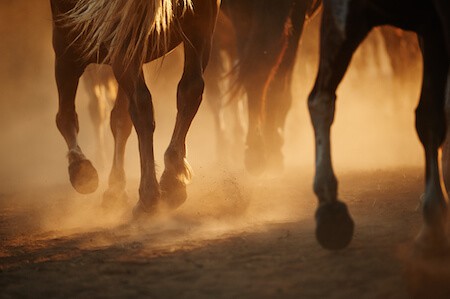The vomiting process in animals is a complex physiological event that requires close coordination between muscle activity and reflexes. When a person vomits, the vocal cords contract while the larynx rises. The diaphragm then pushes upwards which releases pressure against the lower esophagus sphincter allowing stomach acids back out through the mouth or nose creating an urgency for elimination followed by retching – all these things happen quickly.
Horses cannot vomit because they have many key physiological differences to make sure their food only goes in one direction. The muscles in the lower esophageal sphincter of a horse are a lot stronger than in other animals.
This makes it easier for food to go into the stomach, but very hard for it to go back up.
The anatomical structure of the horse’s digestive system is different than in other animals. The esophagus enters the muscular stomach horizontally instead of entering it vertically which also helps keep food down.
The small intestine also has pockets that are bigger in horses than they are in other animals. They hold onto digestible particles until they’re thoroughly broken down before exiting the body through the rectum.
The Horse-Stomach Connection
The horse’s stomach also has more mucous lining as opposed to that of a cow, which again is one of the things that helps with digestion. Along with these differences, they have different amounts of acids in their stomachs as well.

To put it simply, the horse’s digestive system was engineered for super-fast processing and reabsorption back into circulation – not for vomiting.
Horses being unable to vomit could have been an evolutionary adaptation that helped them survive. They are built with a strong digestive system, which helps them avoid consuming toxins.
The need of retaining food in the stomach over vomiting may have also been more important for survival. Having this amazing skill has allowed the horse population not only to live but also thrive without worry.
The horse’s stomach is especially tough, as it has evolved to withstand the constant pounding of galloping.
Do Any Horses Vomit?
There have been rare cases in which vomiting has occurred in horses. However, it’s possible some of these reported cases of horse vomit may actually come from obstruction and not from the stomach.
Horses and ponies do occasionally vomit, but it doesn’t seem to be a natural defense mechanism against illness. The role of the stomach is to break down food into small particles – this is where enzymes and acids go to work.
It’s not clear that vomiting would help in any way, as the process of breaking up food for digestion is already underway by the time it reaches the stomach.
Vomiting is a more common occurrence in dogs, cats, and humans; however, horses don’t seem to vomit for any particular reason. It tends to only happen if they’ve some type of obstruction present.
Dangers of a Horse Not Able to Vomit
Horses being unable to vomit has a few downsides. As a horse lover, you should know about these dangers so that if necessary they can be helped immediately and medics put on the scene as quickly as possible.
The main risk is choking hazards. Choking can happen when the food is eaten remains in the throat or back of the mouth, making it hard for your animal friend to swallow or breathe. It should be treated immediately if this happens.
If you notice any strange bumps along your horse’s neck, it could mean that they are choking. Contact a vet as soon as possible to avoid any potential damage from occurring on this end.
On the plus side, horses are also less likely to get diarrhea than other animals. This is because their stomachs produce more acid that kills off germs that cause gastrointestinal illness.

